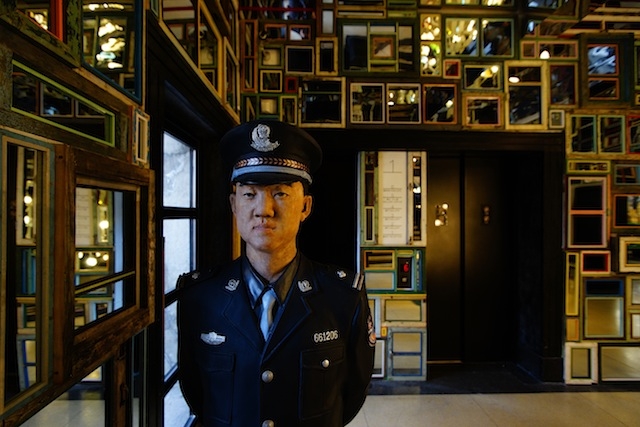Rockbund Art Museum, Shanghai 21 January – 4 June
According to a Confucian proverb, knowledge of the mandate of heaven is attained by the time a person reaches the age of fifty. With wit and insight, Song Dong defies this precept and the fiction that wisdom comes with age. Curated by Liu Yingjiu and Xu Tiantian, Song’s most extensive survey to date in China is organised and unified by a verse the artist has composed using seven characters that encapsulate the philosophy of his past 50 years: jing (mirrors), ying (shadow), yan (word), jue (revelation), li (experience), wo (self) and ming (illumination).
It is fitting that Mirror Hall (2016–17), with its blinding glow, is the point of entry to the exhibition. Mirror, water, reflection and distortions are central themes in Song’s oeuvre. Reflecting light bounces off the shiny plastic panels encased within countless old wooden window frames adorning every centimetre of the walls and ceiling of the museum foyer. Mirror images on these surfaces that appear sharply focused up-close become distorted with each retreating step. In The Use of Uselessness: Bottle Rack Big Brother (2016), brightly lit alcohol bottles that once held Western whisky and potent Chinese baijiu are strapped as surveillance cameras on the steel prongs of a massive downturned Duchampian bottle rack, resembling a giant chandelier. Any footage these ‘monitors’ may capture will be of multiple nondescript forms, like a vision seen through an inebriated haze.
The notion of refraction and distortion continues on the second floor. Mining the Internet, Song located the most abundant and iconic portraits of ten famous and infamous personalities, including Martin Luther King Jr, Marilyn Monroe, Lei Feng and Park Chung-hee, among others, immortalising them in Abnormal Death (2014–16). While each of the presented persons incurred fame during his or her lifetime, the visages blur in and out of focus through a continual rippling effect to highlight the ambiguous circumstances of demises that sealed their legendary status in death.
Song Dong’s exploration with refraction is not restricted to images, but extends to time and space. The Rockbund Art Museum is sited on the former premises of the North China Branch of the Royal Asiatic Society building where a large collection of natural and botanical specimens was once housed. The looming wooden structure Wisdom of the Poor: Song Dong’s Para-Pavilion (2011) is Song’s creation of a museum within a museum, taking up the vast space of the fourth- and fifth-floor galleries. Jingdezhen produced porcelain sculptures of local vegetable-market staples such as broccoli, ginger, mushroom and garlic; alongside them duck, hen, crabs, butterfly and even an instant noodle bowl are meticulously displayed in legless and upturned curio cabinets to provoke postcolonial musings.
The sixth and uppermost gallery breaks into a full crescendo with At Fifty, I Don’t Know the Mandate of Heaven (2016–17) where 15 porcelain dolls enact Song’s signature performances and process-based works. The retinue of replicas modelled after Song’s childhood keepsake marks the finale of the exhibition as an embodiment of a forward rather than a backward glance at the possibilities that his prodigious and expansive artistic career has in store. For Song Dong, heaven’s mandate is yet to come.
From the Summer 2017 issue of ArtReview Asia
